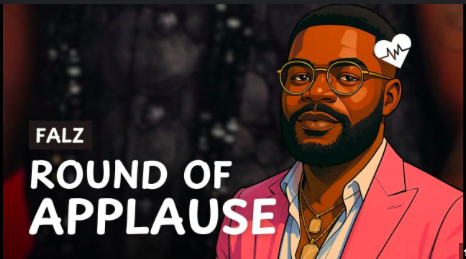Falz opens “Round of Applause” with a crisp, confident declaration: “Fun mi ni round of applause yen”—meaning “Give me that round of applause.” Right away, the tone is celebratory, but layered with irony: Falz is inviting praise while also critiquing the performative culture of fame and success.
In Verse 1, he paints a scene where swagger and couture meet spiritual rituals: “Sign of the cross, ehn … load that in Logic / Emi ma ma floss till I land in my coffin.” Here Falz intertwines religious signifiers with modern digital tools like Logic Pro, suggesting that showmanship and spiritual display coexist in his world. The line “I will floss till I land in my coffin” speaks to a commitment to living flamboyantly—even unto death.
He continues with rhetorical questions: “Igbawo lo ma sup … Bawo lo se ma drop e?” These Yoruba-infused lines ask, “When will you rise? How will you shine?” He recognizes imitation—“You want come dey tap from my sauce, you dey shady”—noting that copying someone’s style doesn’t guarantee the same impact: “It’s okay to try to copy but results may vary.”
The imagery becomes intimate: “Staring in her eyes, I’m engrossed in this lady”— then shifts to existential truth: “For this life, something must kill a man / If your own na enjoyment, e no bad.” The juxtaposition of sensual focus and the inevitability of mortality introduces a bittersweet reflection on pleasure and the temporality of life.
In Verse 2, Falz shifts tone to admiration: “Did I tell you that I love your nappy hair… Your full lips and your perky breasts.” He’s not shying from physical praise, but then immediately questions reality: “Still, I dey wonder / If police go let me rest.” That jolt reflects the tension between desire, social expectation, and societal constraints—especially in Nigeria, where law enforcement presence shapes many lives.
Falz declares: “Dem dey see the evidence… I dey stunt hard.” He owns his visibility and success: he’s no longer anonymous. Yet even as a citizen—“I be citizen and I must see the president”—he feels entitled to influence. “Na me put am there—No be me vote am?” is a powerful rhetorical challenge to the disconnect between governance and representation.
He admits: “I’m not really happy with this whole affair / Wey we dey talk Anglais / Dey worship Français.” He calls out cultural mimicry—the elevation of foreign languages over indigenous expression—even as Nigeria has its own richness.

In the Bridge, Falz turns inward: “Why can’t I just see genius in myself? Why don’t I just stop looking out for help?” He questions his self‑doubt and reliance on external validation: “Got no doubts I could do it all myself.” Yet he acknowledges he is not alone: “Not a one‑man army, you no go fit come tackle us.” It takes a community to support genius, not solitude.
By referencing Yemoja—a Yoruba water deity—Falz connects with traditional spirituality: “Gbe mi lọ s’okun, mo fẹ ki Yemoja” (Take me to the ocean, I want Yemoja). He conjures ancestral protection as he builds in the ghetto—“We take the blocks… build it up, we dey for Legoland.” This echoes community uplift, turning humble spaces into monuments of progress.
The Chorus phrases like “Soft life / Soft nyash / More shine / More pies” capture the hedonistic desires of youth: comfortable living, physical attraction, social visibility, and abundance. But the final line, “We don start,” feels transactional—it’s the beginning of experience, not the end. Falz leaves that lyric hanging as both a promise and question: is this sustainable joy or fleeting indulgence?
Themes & Artistic Devices
- Duality & Irony
Falz balances swagger and worship, celebration and self‑critique. The call for applause becomes a question: what do we praise, and at what cost? - Yoruba-English Blend for Cultural Texture
By code‑switching between Pidgin, Yoruba, and English, Falz grounds his lyricism in daily Nigerian speech. This approach builds authenticity and bridges audiences across linguistic lines. - Self‑Reflection vs Public Persona
Falz asks deep questions: “Why don’t I just stop looking out for help?”—yet also revels in “stunt hard.” He’s both vulnerable and vain, aware and performative. - Social Commentary
Lines about politics, foreign language worship, and copying culture point to broader frustrations with systemic hypocrisy and colonial hangovers in Nigeria. - Spiritual Imagery
Invoking Yemoja and elder rituals lands his lyricism in spiritual awareness, not secular bravado. He sees art, fame, and identity as interconnected with heritage. - Sensual Aesthetics
Descriptive appreciation of physical traits—“your nappy hair… full lips…”—lovingly portrays ordinary beauty while resisting idealisation.
Structure & Flow
The song proceeds in a fluid narrative arc: from introduction and bravado to confession, admiration to self-questioning, elevation to spiritual uplift—from “Fun mi ni round of applause” to “we do the mellow dance.”
It begins with energetic declarations, moves through introspective verses, drops into a contemplative bridge, and culminates in a catchy and evocative chorus. This mix of forms—rant, romance, sermon, dance hall—reflects Falz’s talent for movement between emotional registers without losing coherence.
Cultural Context & Impact
Falz is an artist known for blending humour and critique, from album Moral Instruction to spoken‑word interludes and sketches. “Round of Applause” continues that legacy: it isn’t lecture‑heavy; it’s aware and witty, asking listeners to laugh before they think. In a music scene often dominated by surface‑level bravado, Falz uses satire and lyricism to elevate conversation. As noted by AfrobeatPulse, the song is a “vibrant celebration of life and love” but also “sharp‑witted” in critique. He balances the fun with meaningful reflection.
The storytelling is both personal and collective—Falz writes for himself, for his lover, and implicitly for his generation. He pushes audiences to question success narratives, mimicry, and authenticity in a world hungry for applause.
“Round of Applause” is not just an anthem for celebration—it’s a mirror held to modern life. Falz invites applause, but he also asks: “Why applaud? What are you celebrating? And at what emotional or cultural cost?” Through layered lyricism and genre-bending rhythms, he reminds us that beneath the soft life and soft nyash lies real emotion, unresolved identity, and the need for spiritual grounding. It’s a song to dance to—and to think about while dancing.
Added by
Lyricssphere
WRITE A COMMENT
WRITE A COMMENT


No comments yet